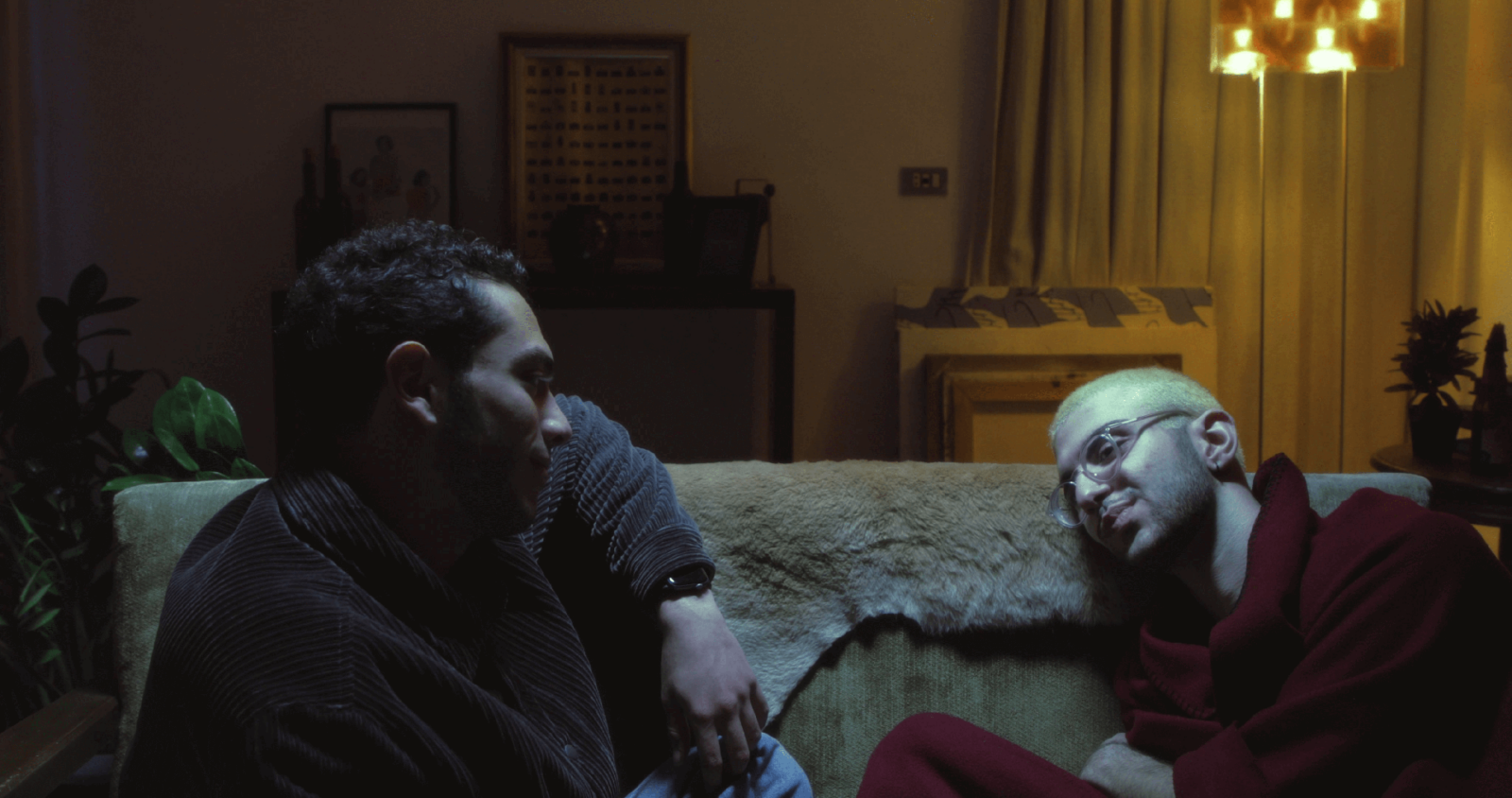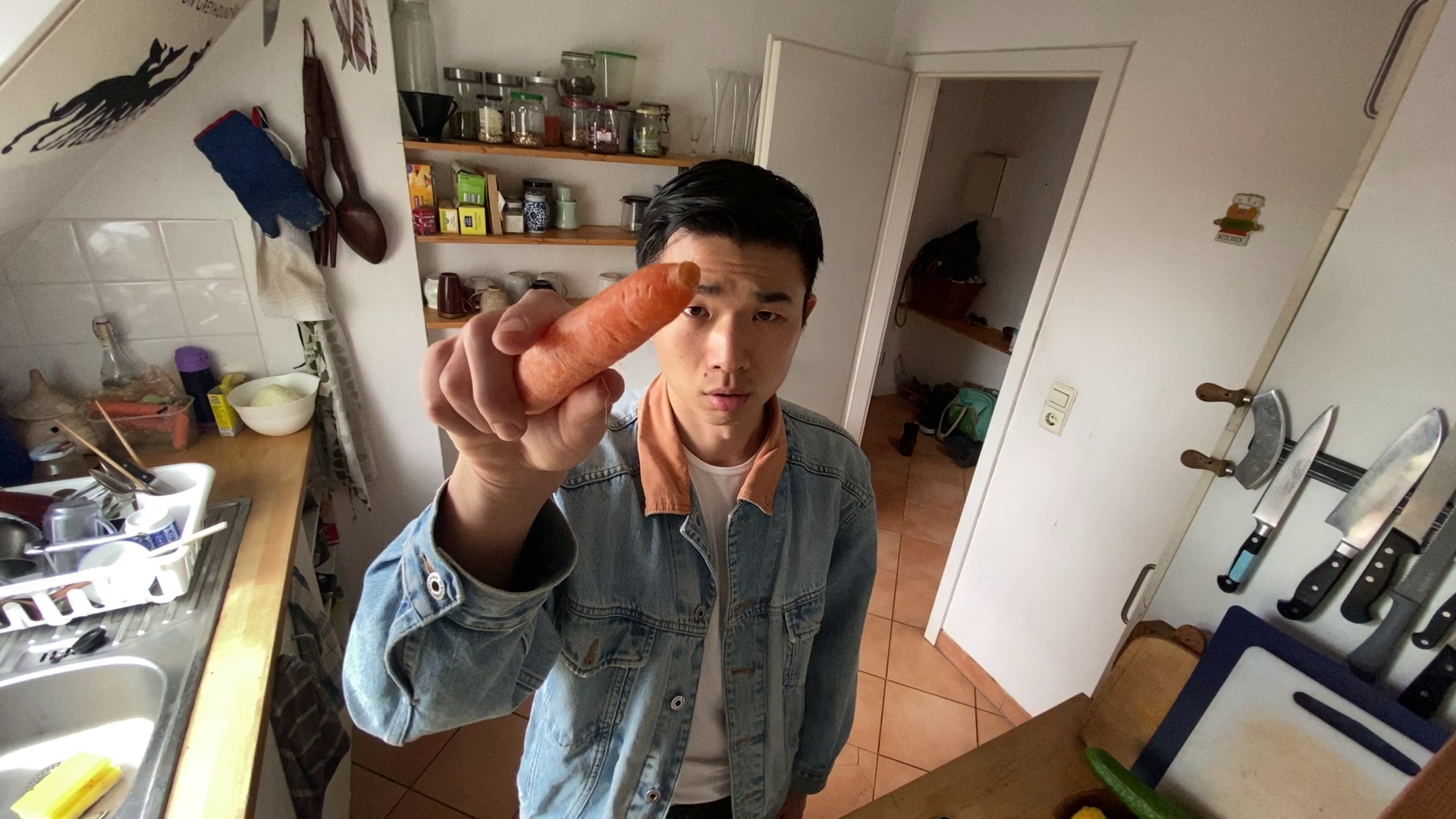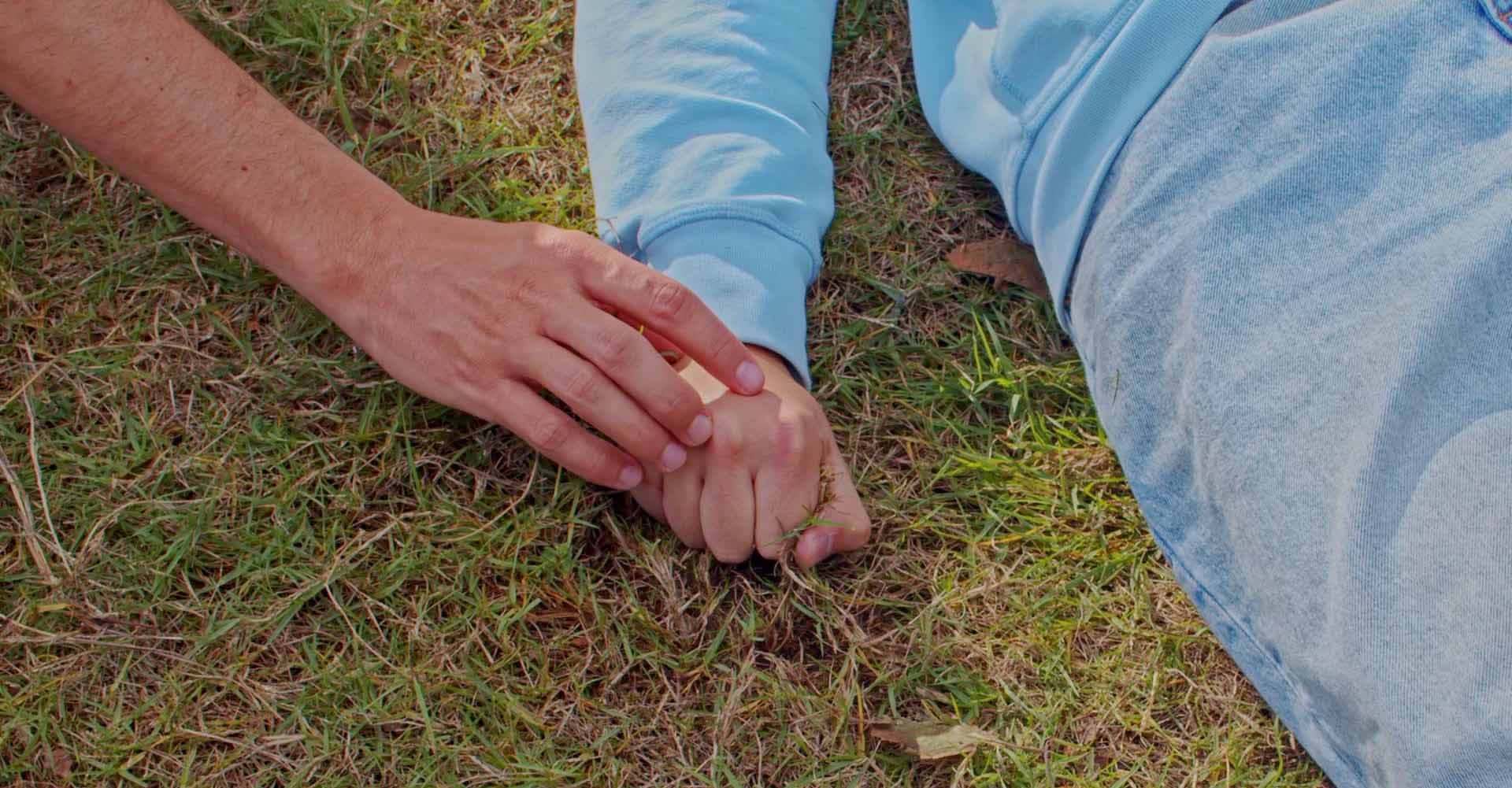Lost in Words
On the Failure and Promise of Language
Among the shorts featured in “Tongues (Re)United”, a programme curated by Berlin-based Chinese filmmaker Popo Fan, Tianyu Jiang finds a shared concern with the power of language to question queer and migrant bodies.

In Looking for Double Happiness (2006), American filmmaker Anna Sophie Loewenberg—also known by her Chinese name ‘Su Fei’—roams Beijing, chatting with people from elderly residents to youth groups about the ever-relevant topic of dating and love. The film is an episode from Loewenberg’s once-viral bilingual webcast Sexy Beijing, and is one of the seven shorts featured in the special programme “Tongues (Re)United” at this year’s Filmfest Dresden. The Chinese dialogues in Looking for Double Happiness are witty and humorous, especially when paired with the rolling, smoky cadence of the Beijing accent, which dilute the awkwardness that often arises in moments of cross-cultural communication. But the short offers more than a good laugh. Loewenberg manages to encapsulate a precious, almost transient moment in the city’s life, when China was undergoing a rapid transformation, eager for global connection, with Beijing preparing for the 2008 Olympics. Produced in the early YouTube days, the clip reveals how language, in the context of everyday urban scenery, becomes a tool for genuine cultural exchange, offering a sharp contrast to the repetitive and staged vox pops that saturate today’s social media. Looking for Double Happiness stands out because it transports us to a time and space where language was used with respect, curiosity, and generosity—qualities often lost during the performative information exchange of the digital age today.
Curated by Berlin-based Chinese filmmaker Popo Fan based on his observation of ‘language-related’ films, “Tongues (Re)United” echoes the festival’s overall thematic focus on solidarity: “At a time when freedom of speech is under threat and fake news floods everywhere, words remain fundamental,” writes Fan in his curatorial statement. This objective translates into the programme’s diverse coverage of topics and genres, from the joy of language in intercultural and cross-generational exchange, as seen in Loewenberg’s street interviews and her latest documentary short Meet Me in Chinatown (co-directed by Jerry Hsiao), to the more fraught terrain of governmentality and censorship controlling the tip of our tongue. What unites these diverse works is a shared concern with the power of language to question and (re)shape identities, particularly for queer and migrant bodies.
Fan also makes it clear that his own experiences—of being both outspoken and unable to speak—were key inspirations for the curation. The urgency of speaking up does not mean that one must, or even can, speak right away. Often, the possibility of resistance through language emerges precisely from being lost in words. Those who cannot speak immediately are frequently the ones deprived of the immediacy of language in the first place. As sociologist Nirwal Puwar argues in Space Invaders, language is innately bound to governmentality; it has been among the effective means “to induce rationality, civility and civilisation in foreign bodies.” Gathering diverse bodies into a shared space can thus create the illusion of diversity and equity—as long as they speak the same language in compliance with the norms of heteronormative whiteness. Instead of encouraging a non-hierarchical exchange, ‘speaking the same language’ signals the logic of assimilation, demanding that the marginalised bodies dissolve into the univocal mass. How, then, can dissonant bodies outside the established order reclaim the legitimacy of their words? How can language regain empathy and intellect when it has been so often co-opted to propagate violence, prejudice, and misinformation?
Fan’s own YouTube-style video, Learn German in My Kitchen (2020), can be seen as a footnote to the curator/filmmaker’s broader conception of language. Created as part of the “4 Wände Berlin” project, which aimed to collectively address the COVID-19 crisis through film, the DIY-style video delivers a direct anti-racist message at a time when Asian (food) culture was increasingly stigmatised in the Western public sphere, alongside a surge in hate speech and violence towards the Asian diaspora. Rather than explicitly saying “I’m a queer Chinese filmmaker,” Fan—as he elaborates in an essay—unfolds this identity by explaining the meaning of his Chinese name and through the video’s ‘camp’ set-up that blends a cooking show with a language class. Fan further discusses the intersection of Asianness and queerness, noting that “being Asian in Germany is highly comparable to being queer in China,” given the marginalised position both identities hold in their respective social-cultural context.

Learn German in My Kitchen (Popo Fan, 2020)
When the dominant language system scrutinises marginalised bodies, it values justification over storytelling. Those who are not subject to the system are expected to explain themselves rather than simply being heard. But what if it is the language of the governing body itself that can no longer be justified? In Invisible Countdown (2024), Berlin-based Israeli Jewish director Amir Ovadia Steklov shares his personal experiences of losing freelance work and estrangement from his family members due to his political stance against Israel’s genocidal actions in Gaza and the Zionist agenda. The film was shot in infrared light, invisible to the human eye, to simulate the discursive climate surrounding what it means to be a peace-loving Jew in Germany now. The question Steklov poses near the film’s end—“Do you even understand what I’m talking about?”—feels less addressed to the audience than to the nation-state itself, one which adjudicates who may speak and live and who must be silenced and die. The exhaustion that comes with the ceaseless demand to speak in a particular language, then, becomes symptomatic of a necropolitical reality of marginalised bodies.
It’s perhaps no coincidence that there is a recurring sub-theme of ‘death’ in many titles in the programme, either positioned at the centre or lingering in the background. The Spanish queer short Water Circles Under Cotton Clouds (2023), co-directed by Roberto F. Canuto and Xiaoxi Xu, for instance, imagines the lives of marginalised bodies in a polarised society shaped by pandemics and reactionary governments. While the film’s overall aesthetic falls short of expectations—with its incohesive character design and languid pacing—the way it engages with language is nonetheless intriguing. Set in a fictional futuristic world, the short shows how language persists to be the means of exposing, humiliating, and dismissing queer lived experiences. Although fashioned in a dystopian form, the use of slurs like ‘freak’ and ‘faggot’, a pandemic with limited cures, closeted queer identities, and the ever-present fear of death—these elements resonate with both the HIV/AIDS epidemic of the 1980s and the queer experiences of the most recent COVID-19 pandemic. In this sense, Water Circles Under Cotton Clouds presents a queer temporality in which the proximity of death reshapes the trajectories of life for othered bodies, who are prone to experience the world in non-linear, nonconforming ways.
In the same vein, another title in the programme, Absolutely No Sexual Favors (2024) by Chinese director Tong Xie, may lack finesse and clarity in its execution, yet conceptually the film remains compelling as it endeavours to explore the role of language in documenting and mourning queer bodies. In one scene, two men—presumably lovers—lie on a bed repeating fragmented French phrases. With one of them unable to fully comprehend the words, the form of language is liberated from the meaning of those words. Speaking becomes a gesture, an attempt to fill the emptiness between the two bodies, and when it fails, that space collapses into the dead silence. Midway through the short, a quote from Last Words from Montmartre by Taiwanese lesbian novelist Qiu Miaojin abruptly occupies the frame. For viewers unfamiliar with Qiu or her lasting influence on contemporary Sinophone queer culture, the citation may seem confusing. Dedicated to “the soon dead self,” Qiu’s posthumous novel comprises twenty letters that can be read in any order—a textual manifestation of the non-linear queer temporalities, with her use of language embodying a mode of queer love and longing too intense to bear. The inconsistent plot of Absolutely No Sexual Favors tries to mimic the fragmented structure of the book. Still, it’s a pity that the short’s minimal, theatrical, and ultimately anti-climactic language design stands at the exact opposite of the frenzy and vulnerability in Qiu’s epistolary pages, where words acquire an almost burning temperature.

Water Circles Under Cotton Clouds (Roberto F. Canuto, Xiaoxi Xu, 2023)
It’s common to notice that many filmmakers working with queer shorts seem to struggle to bridge their conceptualisation of language with cinematic direction, which highlights just how challenging the task is. Because queer bodies carry complex and fluid plural identities. Because queer lives generate their own rhythms of time. In Everything Is Easy, Everything Is Hard (2023), Lebanese filmmaker Pamela C. Saade approaches this enigma by letting her characters simply give up on the need to ‘speak the same language’. The protagonist, Omar—a queer person of colour—delivers a monologue in Arabic that takes nearly three minutes, almost half of the entire short; yet, this ‘ranting’ scene speaks directly to the layered experiences of displacement felt by migrant queer bodies. Like Omar, I must have spat out similar lines to someone close without the expectation of being understood: about the numbing indifference towards surroundings, about feeling alone—not due to the lack of company, but due to the constant internal questioning of “who am I” as a queer person in the diaspora. “Omar, you know that I don’t speak Arabic,” says Alex. But it doesn’t matter. The Arabic letters in Omar’s lines resurface literally, flickering across the frame and covering the pair as they slip back into physical desire, unapologetically. Saade leaves the paradoxes of distancing and yearning intact for both the spectators and the characters. Omar may still be carrying the messy voices within him, but he refrains from investing the energy into translation and explanation. Words need their rest so that tongues may be reunited.
In Precarious Life: The Powers of Mourning and Violence, Judith Butler writes that the language we use to secure legitimacy within a legal framework “does not do justice to passion and grief and rage,” the very forces that tear through the already displaced bodies. Perhaps the inadequacy and failure of words in real-life experiences lead us to place our hope in cinematic language. At the same time, as narrative structures in films tend to lure us into specific emotions and rhetoric, the short film format might amplify this calibration. It seems then much-needed for filmmakers to assign language an alternative form of agency—one that exposes and not performs, and does not shy away from the raw, plain, and grainy texture of communication. Notably, Fan remarks that this special programme pays tribute to the Soura Film Festival in Berlin, an event he describes as “a model for communication and exchange,” which also led to his discovery of Everything Is Easy, Everything Is Hard. From a curatorial perspective, then, we might as well see “Tongues (Re)United” as a promising gesture, suggesting the simultaneous off-screen cultivation and sustainment of friendship and queer kinship on the festival circuit. We may be lost in words, but we will stay in touch.

